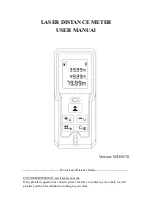
MA160
‐
en
‐
GB_V1.0
10/15
17
Diode
Test
1.
Insert
the
black
test
lead
banana
plug
into
the
negative
COM
jack
and
the
red
test
lead
banana
plug
into
the
positive
jack.
2.
Turn
the
function
switch
to
position.
Use
the
M
button
to
select
the
diode
function,
the
diode
and
voltage
symbols
will
appear
on
the
LCD
when
in
Diode
test
mode.
3.
Touch
the
test
probe
tips
to
the
diode
or
semiconductor
junction
under
test.
Note
the
meter
reading.
4.
Reverse
the
test
lead
polarity
by
reversing
the
red
and
black
leads.
Note
this
reading.
5.
The
diode
or
junction
can
be
evaluated
as
follows:
If
one
reading
displays
a
value
(typically
0.400V
to
0.900V)
and
reverse
reading
displays
OL
,
the
diode
is
good.
If
both
readings
display
OL
the
device
is
open.
If
both
readings
are
very
small
or
‘
0
’,
the
device
is
shorted.
Fig
4
‐
8
DIODE
TESTING
Shop for Extech products at:
1.888.610.7664
ShopExtech
.com





































